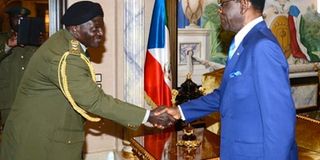Prime
Why UPDF deployed in Equatorial Guinea

Welcome. Former Chief of Defence Forces, Gen Katumba Wamala (left) meets president Teodoro Obiang Nguema Mbasogo in Malabo, Equatorial Guinea, on July 28 last year. PHOTO BY GUINEA CUATORIAL PRESS
What you need to know:
- According to the US intelligence agency, CIA fact book, Equatorial Guinea has a small army of about 1,500 troops. It has 400 policemen, 200 navy service members, and about 120 in the air force.
- The 75-year-old Teodoro Obiang Nguema Mbasogo assumed power in August 1979 after mounting a coup that toppled his uncle, Francisco Macías Nguema, who was also the country’s first president.
KAMPALA. The first batch of Uganda People’s Defence Forces (UPDF) troops left quietly for Equatorial Guinea late last year for a covert mission of reinforcing security for that country’s president Teodoro Obiang Nguema Mbasogo, and officially to strengthen capacity of the Guinean armed forces, according to highly placed military sources.
The troops, drawn from different army units — Logistics, Special Forces, Intelligence, Medical and Motorised Infantry — are also said to have left with own military hardware, which the army spokesperson Brig Richard Karemire denied but acknowledged that the first batch left last year for “reconnaissance” before others could go.
“There is nothing like that, as if they were going to fight war. That is not correct,” Brig Karemire told Saturday Monitor.
“Equatorial Guinea is a brotherly country to us, and it is for that reason our forces were invited to help train the Guinean forces to attain a certain level of professionalism — that is all.”
He added: “We are helping our brothers on the continent when we are called upon to, and as [Saturday] Monitor, you should be looking at it that way and supporting us.”
According to the US intelligence agency, CIA fact book, Equatorial Guinea has a small army of about 1,500 troops. It has 400 policemen, 200 navy service members, and about 120 in the air force. The country was thrust into the spot recently for granting asylum to former Gambian strongman Yahayah Jammeh, who was forced out after 22 years in power by Economic Community of West Africa. Mr Jammeh had conceded defeat in the elections but later tried to cling on.
Long serving leaders
President Obiang Nguema is ranked the longest serving non-traditional leader in the world, with 37 years under his belt. He is followed by Angola’s Jose Eduardo dos Santos with 36 years, Zimbabwe’s Robert Mugabe (36 years); Cameroon’s Paul Biya (33 years); Uganda’s President Museveni (31 years); and Sudan’s Omar Bashir (27 years).
Brig Karemire explained that in the one year renewable mission, according to the Status of Forces Agreement, Equatorial Guinea agreed to cater for transport, logistics, feeding, allowances and other incidentals of the Uganda troops.
Although the army says it deployed about 100 troops to the central African oil-producing but impoverished country, sources familiar with the matter put the numbers at more than 150. The last batch of troops are said to have left on January 17.
Uganda already has more than 6,000 troops in Somalia deployed under African Union and two battalions in the Central African Republic hunting down the Lord’s Resistance Army rebels led by Joseph Kony, who is wanted by the International Criminal Court.
The first batch that left under the command of Lt Col Wycliffe Keita had prior to the deployment trained at the UPDF camp in Singo. Lt Col Keita recently served in Somalia under United Nations Guard Unit that protects UN installations.
Asked whether before the deployment the army had sought parliamentary approval, Brig Karemire said approvals are requisite when it is a peace-keeping mission “but in this case, it is not.”
Apparently, the deployment was preceded by back and forth engagements at the highest level.
President Nguema’s minister for external security, Mr Juan Antonio Nchuchuma, was in Uganda on July 16 last year and is said to have carried a “special message” for President Museveni with whom they held a private meeting.
On July 28, the former Chief of Defence Forces, Gen Katumba Wamala, flew to Malabo, the country’s capital, with a special “textual message” for president Obiang Nguema and the two discussed military cooperation, according to information available to Saturday Monitor.
The Museveni - Nguema affair
The 75-year-old Teodoro Obiang Nguema Mbasogo assumed power in August 1979 after mounting a coup that toppled his uncle, Francisco Macías Nguema, who was also the country’s first president. The former, considered likely to have been a psychopath, is regarded as one of post-independent Africa’s cruellest and corrupt leaders.
However, after several years in power, president Obiang Nguema became a copy and paste of his uncle. His single party government is known for its repressive tendencies, crackdown of Opposition, and excessive corruption. According to the International Monetary Fund, Equatorial Guinea boasts the highest level of per capita income in all sub-Saharan Africa, at $22,300 (about Shs79 million) per year, about the same as Portugal but more than three-quarters of the population live below the poverty line.
According to the New York based Natural Resources Governance Institute that monitors transparency in extractives, the country is the third-largest oil producer in sub-Saharan Africa, supplying 304,000 barrels a day, but its oil revenues are mostly misused.
President Nguema is currently deputised by his son Teodoro Nguema Obiang Mangue, who is seen as the next in line. Junior Nguema is known for living large with mansions in America and Europe. Last October, authorities in Switzerland commenced investigations into the wealth of the young Nguema at the request of France on claims of money laundering.
President Obiang Nguema, like other African strongmen, is known for preaching pan-Africanism, especially during African Union (AU) Summits. The 23rd AU Summit was held in Malabo in 2014.
At President Museveni’s swearing-in for a fifth elective term in office last May, president Obiang Nguema was one of the 11 African leaders that graced the occasion.




